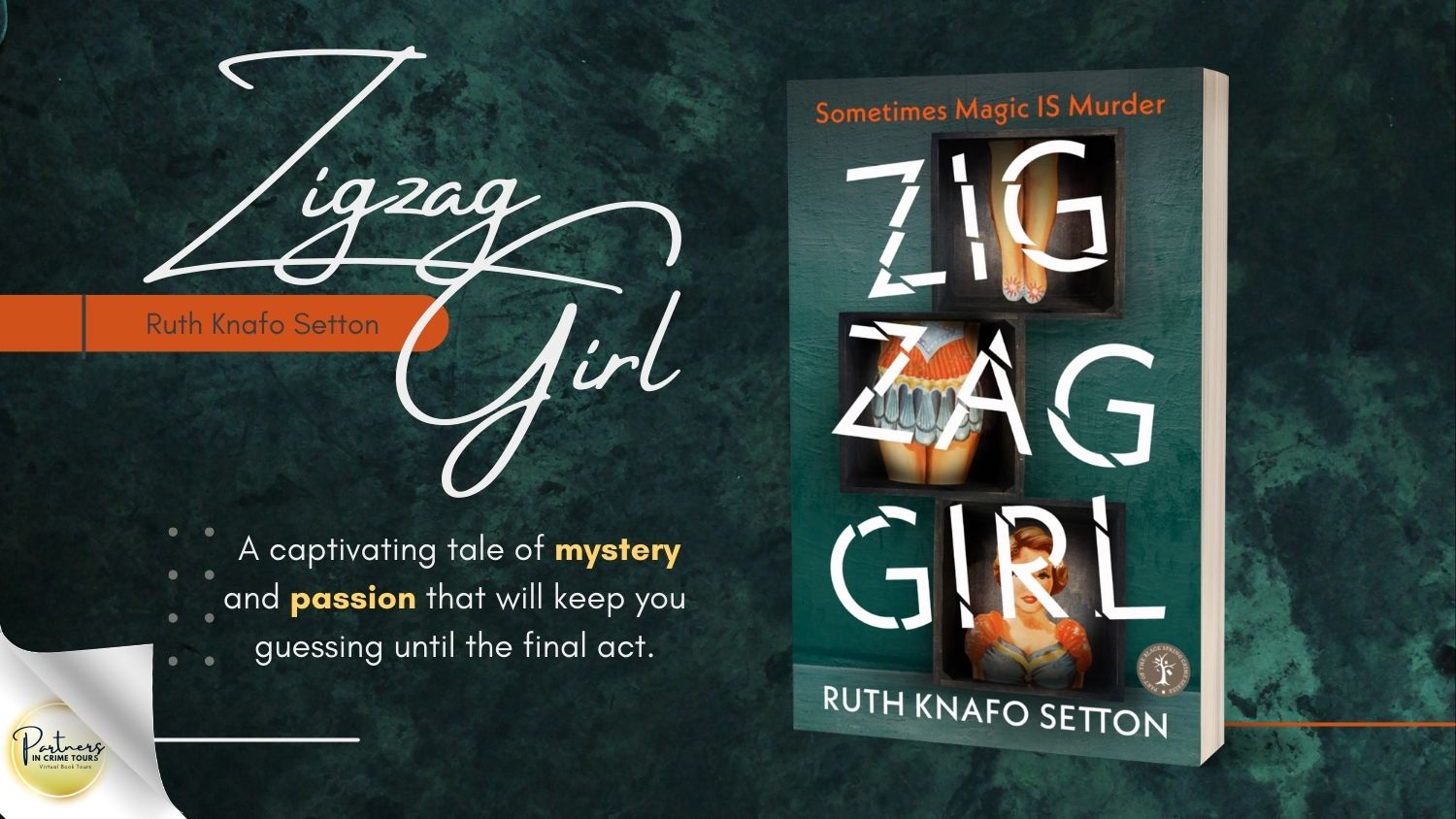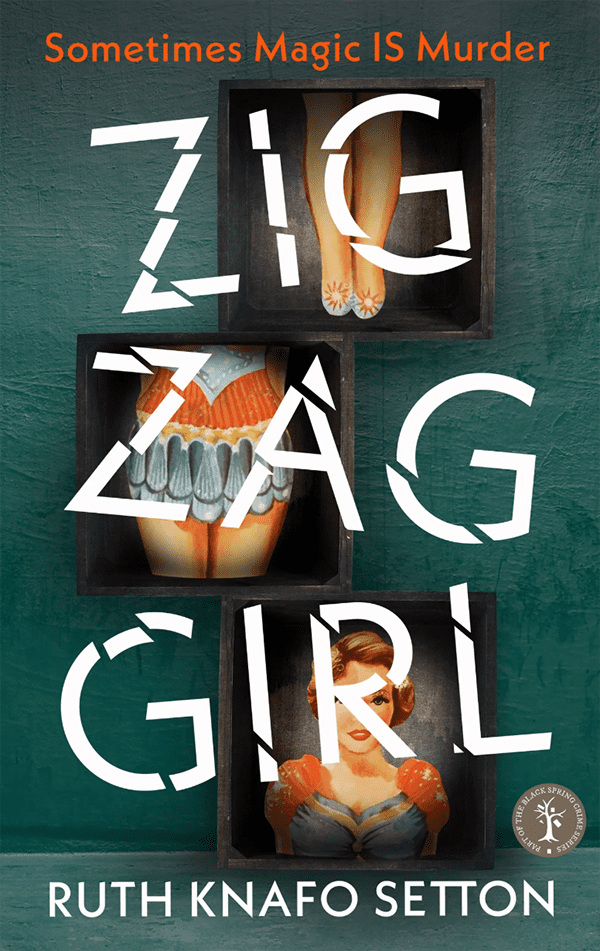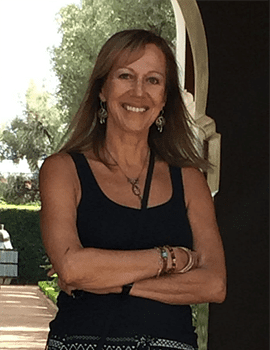by Ruth Knafo Setton, is a twisty contemporary mystery with a touch of magic, set in Atlantic City and the eerie New Jersey Pine Barrens. Lucy Moon, a brilliant young magician with a mysterious past, works in the town’s theatre, staging performances of enchantment and conjure. But one night, during the ‘Sawing a Woman in Half’ trick, Lucy discovers her friend’s body in the box, dead. As Lucy digs deeper, she uncovers a trail of murders and suspects. With the help of a fierce group of female magicians and mystics, she must expose the truth before she becomes the final act.
Chapter 1
Atlantic City
Wednesday October 17
24 years later
Nine minutes to the finale.
Hand me a flower and I’ll transform it into a dove. Shoot me from a cannon and I’ll come out smiling. But lock me in the box and saw me in half, I’ll scream bloody murder.
Unheard of for a Moon – a member of America’s most famous magic family – to be terrified of that creaky old standard, the sawing box. But you’re hearing it now.
In exactly nine minutes, Charlie, our production manager, and Van, my friend and co-star, are supposed to reenact the famous Sawing a Woman in Half illusion as it was performed by Magnificent Morelli and his assistant Cleo West in this theatre during World War Two.
The classic poster hangs in the dressing room: a man with slick black hair and a thin moustache gesturing to a pretty strawberry-blonde who holds a Statue of Liberty torch.
Between them is the infamous sawing box. Black letters slash across the top of the poster:
MAGNIFICENT MORELLI! MAN OF MYSTERY
At the bottom:
NIGHTLY IN THE SCARLET ROOM WORLD-FAMOUS ATLANTIC CITY BOARDWALK
There’s one problem. Van should have been here two hours ago.
My best friend and other co-star, Stormie, and I managed to get through the show to this point because we’re used to working together and because even in the midst of frenzy, Charlie is an oasis of calm. We call it the Charlie effect. He quickly redesigned the order of illusions to make up for Van’s absence.
But Van still hasn’t shown up, so Charlie will saw me in half in Cleo’s original sawing box. This is not the contemporary sleek or transparent sawing box you see on a Vegas stage, but the real thing. Pure old-school; a deep, long wooden container that resembled a coffin. No openings for head or feet. No clamps for neck or ankles. The kind of box in which the magician’s assistant is completely locked inside, head to toe. If that’s not horrifying enough, this is the same box in which Cleo’s murderer placed her body.
Good publicity for a haunted theatre on Halloween, says Charlie.
At five-seven, I’m two inches shorter than the box. Stormie, coming in at a fraction under six feet and 190 pounds, can’t even squeeze inside.
Hanging right next to Morelli is our poster:
HALLOWEEN THRILLS, CHILLS & BLACK MAGICK! REBEL MAGIC
STORMIE, VAN, & LUCY BLACK WIDOW THEATRE, 13TH FLOOR – if you dare! MIDNIGHT CASINO, OCT 17 – NOV 10
Van and I flank Stormie – a magical version of Charlie’s Angels. As if instead of fighting crime, we resolve to change the world, one trick at a time. In the middle, Stormie towers over Van and me in an orange and black dashiki gown, enormous hoop earrings glinting through her copper- black hair that falls in long ropelike locks. On Stormie’s left is Van, a tiny silvery futuristic superhero who sometimes bills herself as ‘Kickass Korean Babe’ – spiked hair, jumpsuit, thigh- high boots with four-inch heels, and a gleaming knife in each hand. On Stormie’s right, I sparkle in my red-hot Miss Scarlett dress and stilettos. That’s me, on the corner of woo-woo and fuggedaboutit – a magic wand in one hand, a cannoli in the other.
Tonight is our opening night, and it means something big to all three of us: our breakthrough as sisters of magic, an opportunity to make our name in the good old boys’ world of magic, and for me, a chance to make my name without the Moons holding me up on stage.
Van wouldn’t miss this for the world.
Her silver jumpsuit is hanging on the wheeled rack, her knives ready for action. She’s not answering her phone, but during the intermission, she left Stormie and me a message: Emergency. Start without me.
Stormie’s golden-brown eyes were huge, her olive skin sallow, making the freckles stand out. ‘Emergency?’ Her voice is shrill. ‘That is not a Van word.’
‘An accident?’ ‘She’d tell us. No, it’s MLD.’
For the past couple weeks, Van has kept her new boyfriend on the lowdown. Boyfriend is normal – Van juggles men like her knives. Keeping him secret is not. Stormie calls him, ‘MLD,’ short for Mysterious Loner Dude.
‘Van would not miss our opening night for a guy, no matter who he is.’ ‘Then where is she?’ Stormie shook her fingers in my face. ‘Look at my hand. The girl’s giving me shpilkes.’ Whenever she’s emotional, Stormie brings out the Yiddish words her Jewish Nana taught her.
‘If by shpilkes, you mean bad vibes, I’ve got ’em too.’
Chapter 2
Seven minutes to the finale.
Backstage, hands trembling, I tug on Cleo West’s very own Stars n’ Stripes gown, slithering into the shimmering satin. Too short for me. Seams fraying – it’s been let out and tightened more than once. Cleo must have gained and lost weight during the war years.
I sit at the vanity, tightly clip my hair and pull on a long reddish-blonde wig. I hate wigs, they suffocate me and give me an instant headache.
Trapped, wrapped and bundled inside the constraints of hair and layers of fabric, my heart staccatos. When did the theatre get so cold? The scent of lavender crawls over my flesh, the sign that the Widow’s resident ghost, Cleo, is in the house. When you grow up with an Irish witch as an aunt, you accept the presence of ghosts. Doesn’t mean you like them, but you come to terms with sharing the space. According to Auntie Maze, ‘Cleo wants us to see the cracks and stains left behind by the past. When she slams doors or turns off lights, she’s saying, “Look! There’s something you’re not seeing!”’
I add final touch-ups to my stage make-up and check my reflection from every angle. I glimpse pinpricks of light in the mirror. Next to my reflection a woman’s face appears, rippling as if she’s underwater. Her fiery-gold hair wavers. Ice-pale eyes meet mine. Two Cleos in the mirror.
I grab the edge of the table. This is the first time she’s shown herself to me! Just in case she’s really there and I’m not losing my mind, I whisper, ‘You’re not real, Cleo. You’re dead. Look, I’m just pretending to be you for an hour, okay? Now please go away.’
She stares at me through the glass. Her lips move. I lean forward, press my face to the mirror, straining to hear.
Cleo disappears, and a large black figure looms in the mirror. Moves closer.
I jolt to my feet and whip around.
A man wearing a black hoodie. At least he’s real, not a ghost. He pushes back the hood. Dark hair falls past his chin.
‘What’s going on here?’ he demands.
Shifting on my feet, I keep my hands low at my sides, ready to punch. ‘You need to leave now.’
He steps closer. He’s half a foot taller, his strong-boned face scowling, his eyes bitter as black coffee. ‘Where’s Van?’
‘Not here.’
‘She said I could come backstage.’
‘Who are you?’ Is he Van’s mysterious guy?
Stormie arrives, breathless. ‘You’re on in five,’ she says to me, and then slits her eyes at the stranger. ‘Elvis Jones! What are you doing here?’
This is Elvis Jones? Definitely not the cheesy overweight Elvis impersonator in a white jumpsuit I imagined when I saw his poster:
Elvis Jones Magic in Hell
Midnight Show No one will be admitted after the door is shut.
I found the blurb pretentious and, on principle, refused to see his show. If I’d known what he looks like, I might have taken a chance. He watches me with a sardonic grin as if he knows what I’m thinking.
‘Hi, Stormie,’ he says. ‘I’m looking for Van.’
‘She hasn’t arrived. Yet.’
He retreats toward the door. ‘I’m outta here.’
Stormie and I watch him leave, and she mutters, ‘What the hell has that girl been up to?’
‘I’m scared for her.’ I hear the words and wish I hadn’t said them.
‘Maybe her phone died, and she’s stuck somewhere. She’s gonna show up.’
***
Excerpt from Zigzag Girl by Ruth Knafo Setton. Copyright 2025 by Ruth Knafo Setton. Reproduced with permission from Ruth Knafo Setton. All rights reserved.
Click through the other tour stops for can’t-miss reviews, insider interviews, exclusive guest posts, and more chances to win!










